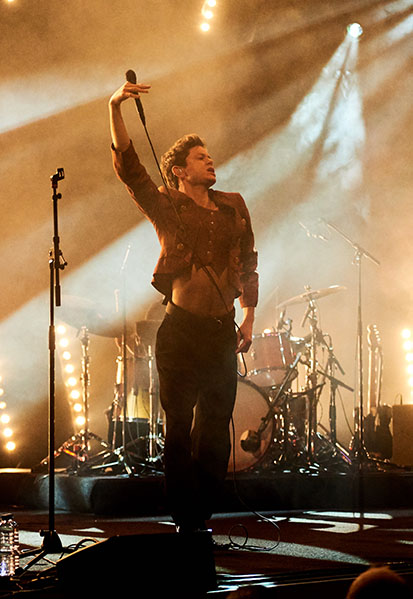
Adalya Nash-Hussein on Perfume Genius
Last year Melbourne Recital Centre launched its inaugural Writer-in-Residence program, welcoming Australian author and journalist Chloe Hooper who shared her thoughts and responses to a range of events at the Centre.
In 2018, we've partnered with the Emerging Writers Festival and over course of the year will bring you pieces from three diverse female writers on the rise who are already making their mark on Australia’s literary landscape.
In her first piece for Melbourne Recital Centre, Melbourne writer Adalya Nash-Hussein recounts her experience watching pop-provocateur Perfume Genius at his Elisabeth Murdoch Hall show in March. Adalya's piece is complemented by a soundscape to underscore your reading experience. Click the SoundCloud player above to begin.

Generally, I prefer listening to music with the volume low. I am first given the ability to hear privately at the beginning of high school, and from here onwards I am perpetually tweaking the volume of my iPod and later iPhone to remain in the Goldilocks zone between uncomfortably loud and slightly difficult to hear.
In my teens, I buy a practice mute for my violin so I can practice in my family’s apartment at more antisocial hours. The mute is shiny and weighty and it sits snuggly around the bridge of my instrument; it almost resembles a grill. I begin to prefer the small, tinny sound of it. After a few weeks, my violin teacher forces me to stop using it, says the quality of my sound has deteriorated.
Perfume Genius’s music is undeniably intimate and this, combined with the biographical details that singer Mike Hadreas has shared, has encouraged critics and interviewers to project a narrative onto his albums; his sound and self have ‘grown’, fragility and trauma building to transcendent boldness. ‘What people describe as badass or strong usually has to do with volume. If the volume is up and loud, people think you’re a badass.’

Throughout my classical training, the relationship between volume and dynamics is increasingly complicated. In simple music, piano means soft and forte means loud. The character of the fortes and pianos is either identical or obvious—a timid piano, a boisterous forte.
‘I guess the music only feels good when it makes me really uncomfortable to write and to perform, you know, when it’s even a bit out of my range and requires more of me than maybe I naturally have in the moment… Even though it started really meek and quiet, that was a lot for me to do at that point and so I keep adding stuff on and doing it even though I know I’m afraid.’
I am a bad soloist (in part) because I am never able to create a piano that isn’t also shy, a piano where my bow still makes weighty contact with the string. At university, my teacher brings it up in every lesson. ‘You should hear a sort of tchtchtchtch sound underneath the note’, he says, pushing my forearm into the string.
What I miss most now is playing in orchestras. In the middle of a string section, carefully matching your bow strokes to the people around you, you become aware of your body as connected to the other bodies around you. There are these dramatic swells where the orchestra rises as one, and this collective energy overwhelms me unlike anything else I’ve experienced. Time seems to hover in the melodrama and I have to stop myself from laughing out loud.
Hadreas often pauses slightly on consonants, stretches out Ss especially. It’s something my singing teacher warns against, vocal sounds are purest and best projected on vowels. The consonants in Perfume Genius's music are sticky sweet, a guttural intimacy that slows time.
In The New Yorker, Jia Tolentino describes the phenomena of ‘in an empty mall’ edits of popular songs. Closing my eyes to listen, the spatial sensation of these recordings is palpable, a manufactured sense of context that can sometimes be lost listening to recordings. There are some pieces where I can still feel an echo of what it would be like to play them in an orchestra, where my heart leaps in that same way. They’re moments that usually stress my partner out. On our second date I take him to a concert my teacher has given me tickets to. The orchestra is playing a Tchaikovsky symphony that I’ve played before, and I squeeze his hand in anticipation for my favourite sections. Afterwards, when he tells me he found them too tense or too dense, I am perplexed. Now, I listen to these kinds of pieces less. I wonder if it’s possible to hear that second-hand orchestral emotional overflow without feeling some sense of failure.
Watching Perfume Genius live gave a strange replication of that bodily pull that I miss. In the concert hall, where I can’t turn the volume up or down, Hadreas's dynamic control is overwhelming. The quieter his voice is, the more tense it becomes, the more I feel the underlying ‘tchtchtchtch’. I hang from it. And then I'm dropped into sound so dense I feel like I’m swimming through it, floating.

About the writer:
Adalya Nash-Hussein is an ex-conservatoire violinist with a background in experimental criticism. She is interested in the possibility of exploring pre-recorded sound elements alongside written material as well as traditional critical essays.

